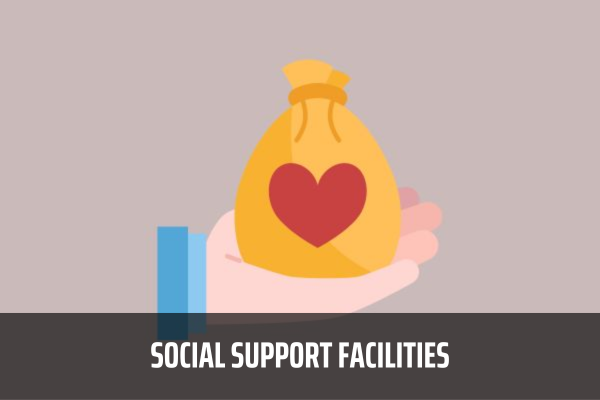From 2020 to 2030: What is the scale of care at social support facilities in Vietnam under the Decision 966/QD-TTg 2023?
From 2020 to 2030: What is the scale of care at social support facilities in Vietnam under the Decision 966/QD-TTg 2023?
Pursuant to Article 3, Chapter III of Decision 966/QD-TTg 2023, the Prime Minister regulates the scale of care at social support facilities from 2020 to 2030 as follows:
- Ensuring the provision of care services at social support facilities for people in special difficult circumstances, wandering, vulnerable, and increasing the care capacity at facilities from 45,000 people in 2020 to 65,000 people in 2030, including an increase in care capacity at non-public facilities from 30,000 people in 2020 to at least 42,000 people in 2030, specifically:
+ Elderly people receiving care at social support facilities to reach a minimum of 10,000 people by 2030.
+ People with mental disorders, people with mental disturbances receiving care and functional rehabilitation at social support facilities to reach a minimum of 10,000 people by 2030.
+ Children with special circumstances receiving care at social support facilities to reach a minimum of 15,000 people by 2030.
+ People with disabilities receiving care at social support facilities to reach a minimum of 10,000 people by 2030.
+ In comprehensive social facilities and social work centers, the number of people receiving care should reach a minimum of 20,000 people by 2030.
- Ensuring the provision of services for all drug addicts in drug detoxification facilities, from 38,000 students in 2020 to 86,000 students in 2030.

From 2020 to 2030: What is the scale of care at social support facilities in Vietnam under the Decision 966/QD-TTg 2023?
Who are the social protection beneficiaries with particularly disadvantaged conditions in Vietnam?
Pursuant to the provisions of Article 24 of Decree 20/2021/ND-CP, the provisions are as follows:
Social protection beneficiaries receiving care and nurture in social support facilities and social houses (hereinafter referred to as “social support facilities”)
1. Social protection beneficiaries with particularly disadvantaged conditions include:
a) Individuals specified under Clauses 1 to 3 Article 5 hereof who face difficulties, cannot live on their own and receive no care and/or nurture in community;
b) The elderly eligible for receiving care and nurture in social support facilities as per the law on the elderly;
c) Children with disabilities, persons with disabilities eligible for receiving care and nurture in social support facilities according to regulations and law on the elderly.
2. Individuals requiring emergency protection include:
a) Victims of domestic violence; victims of sexual assault; victims of trafficking; victims of labor abuse;
b) Children and beggars waiting for transfer to residence;
c) Other individuals according to decisions of Chairpersons of People’s Committees of provinces.
3. Minors, individuals no longer capable of working eligible for receiving care and nurture in social support facilities according to regulations and law on imposing penalties for administrative violations.
4. Duration for provision of care and nurture for beneficiaries specified under Clause 2 of this Article in social support facilities and social houses shall not exceed 3 months. If beneficiaries are not returned to families or community after 3 months, superior agencies of social support facilities shall consider and decide on appropriate solutions.
5. Beneficiaries voluntarily live in social support facilities include:
a) The elderly conforming to trust contracts for care;
b) Individuals not specified under Clauses 1, 2, and 3 of this Article ineligible for living in families and wishing to live in social support facilities.
Thus, based on the above regulations, social protection beneficiaries with particularly disadvantaged conditions include:
- Individuals specified under Clauses 1 to 3 Article 5 of Decree 20/2021/ND-CP who face difficulties, cannot live on their own and receive no care and/or nurture in community;
- The elderly eligible for receiving care and nurture in social support facilities as per the law on the elderly;
- Children with disabilities, persons with disabilities eligible for receiving care and nurture in social support facilities according to regulations and law on the elderly.
What are the tasks of social support facilities in Vietnam?
Pursuant to Article 7 of Decree 103/2017/ND-CP, a social support facility shall perform several or all of the following tasks:
- Provide emergency services, including:
+ receive persons in need of emergency protection;
+ evaluate the needs of beneficiaries; select and classify beneficiaries. Where necessary, the social support facility shall transfer beneficiaries to health facilities, education institutions, police agencies, judicial agencies or other appropriate agencies or organizations;
+ ensure safety and meet certain emergency needs of beneficiaries such as temporary residence, foods, clothes and travel.
- Provide advice and treatment for mental disorder or psychological crisis, and physical rehabilitation for beneficiaries.
- Provide consultancy and assistance for beneficiaries of social support policies; cooperate with relevant agencies and organizations to protect and help eligible beneficiaries; look for and arrange appropriate caring forms.
- Formulate plans to intervene and assist beneficiaries; supervise and review intervention and assistance activities, and then modify such plans.
- Receive, manage, care for, and nurture social protection beneficiaries who face special difficulties, are unable to earn their living as well as live in their families or communities.
- Provide initial medical treatment services.
- Combine rehabilitation and assistance activities for beneficiaries with self-management, cultural, or sports activities and other activities according to age and health status of each group of beneficiaries in accordance with laws.
- Take charge and cooperate with relevant units/ organizations to organize education courses, vocational training courses and/or career-oriented education courses so as to assist beneficiaries in developing their physical strength, understanding and personality as well as getting social inclusion.
- Provide social education and capacity improvement services. To be specific:
+ provide social education services to help beneficiaries develop skills in handling situations, including teaching parenting skills to persons in such need, and providing life skills training for children and minors;
+ cooperate with education and training institutions to provide training courses in social works for both full-time and part-time social workers or persons working for social work service providers;
+ organize training courses or seminars to improve knowledge and skills for beneficiaries in such need.
- Manage beneficiaries of social work services.
- Implement measures to protect beneficiaries from difficult circumstances, assaults, violence or abuse.
- Facilitate community development activities. To be specific:
+ contact people and governments at all levels to determine problems in their communities so as to formulate suitable community assistance programs or plans;
+ propose community development policies to competent authorities;
+ establish the network of social workers and volunteers.
- Organize awareness-raising and communications activities.
- Take charge and cooperate with local government help persons who are qualified to leave the social support facility or voluntarily apply for family reunion and community integration; support and facilitate beneficiaries in stabilizing their life.
- Manage financial sources, assets, officials, public employees and contractual employees in accordance with laws.
- Mobilize and receive financial supports in cash and in kind from domestic and foreign agencies, organizations and/or individuals.
- Provide services at the request of and perform other tasks assigned by competent authorities.
LawNet
